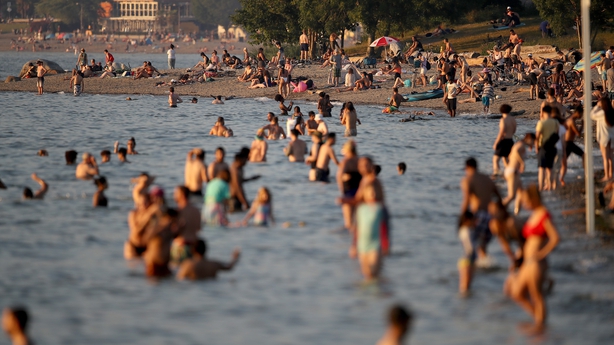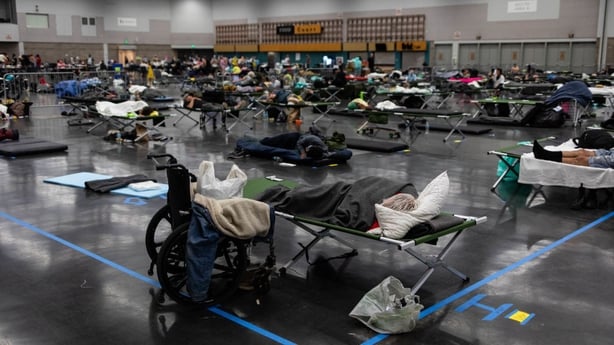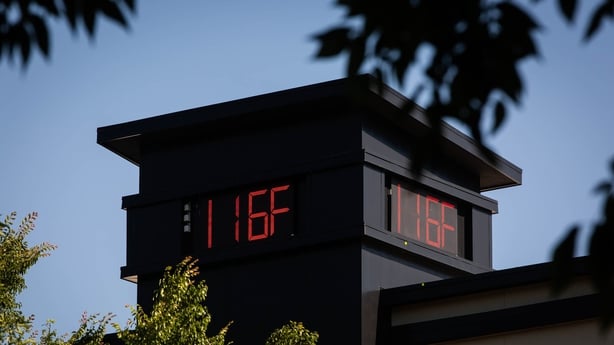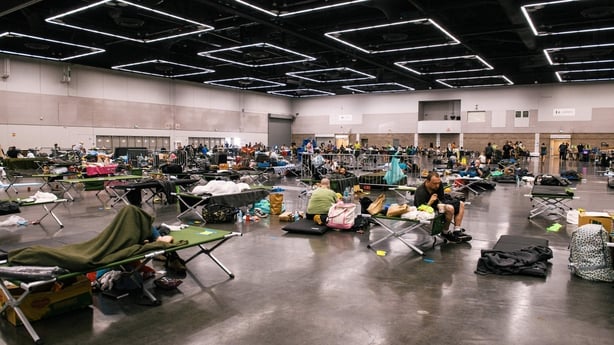Canada's deadly heatwave, the most severe on record, is moderating slightly, but is still set to erase high temperature marks set decades ago, a government climatologist has said.
At least 233 people died in the Pacific coast province of British Columbia between Friday and Monday, about 100 more than the average for a four-day period, the Coroners Service said.
The heatwave has scorched crops across the Prairies, where farmers grow much of the world's wheat and canola, driven up natural gas prices in the fourth-largest global producer, and increased the risks of wildfires.
Lytton, a town in central British Columbia, this week broke Canada's all-time hottest temperature record three times.
It now stands at 49.6°C. The previous high in Canada, which is widely known for its brutal winters, was 45°C, set in Saskatchewan in 1937.

The heat dome stretching from California in the United States to Canada's northern territories is weakening as it moves east, but is still intense enough to set records from Alberta to Manitoba, said David Phillips, senior climatologist at Environment and Climate Change Canada.
It is unclear what triggered the dome, but climate change looks to be a contributor, given the heatwave's duration, extremes, and the fact that it is setting new temperature highs a month earlier than the usual hottest time of year, he said.
"In some of these places, their records are being annihilated," Mr Phillips added. "It really is spectacular, unprecedented for us."

Most of Alberta and large parts of British Columbia and Saskatchewan are at extreme risk of wildfires, according to Natural Resources Canada's fire weather map.
Fire is likely to spread across Western Canada in the next week, and the summer could produce an active fire season, said Mike Flannigan, professor of wildland fire at University of Alberta.
"All the ingredients are there," he said. "It's a powder keg just looking for a spark."
Hot temperatures forecast for the coming weeks may cause the crop's flowers to drop prematurely, creating potential for reduced farm yields, said Shane Paterson, director of trading and transportation at Paterson Grain.
Prairie farmers are already coping with one of the worst drought in years.
Migrant workers on fruit farms are particularly vulnerable, said advocate Byron Cruz of Sanctuary Health, an organisation that helps migrants.
Some working in BC greenhouses, where temperatures can be six degrees warmer than outside, have said they felt faint in the stifling heat, but are unwilling to take breaks to cool off, fearing they will not be rehired, Cruz said.
Construction workers with precarious immigration status who are unwilling to work in the heat are guaranteed to lose income, he said.
The heatwave is also driving up demand for natural gas, boosting June spot prices in Alberta to a seven-year high, according to Scotiabank. Natural gas is used to produce electricity.
We need your consent to load this rte-player contentWe use rte-player to manage extra content that can set cookies on your device and collect data about your activity. Please review their details and accept them to load the content.Manage Preferences
Canada is widely known for its brutal winter and snows, and, prior to the weekend, the historical high in Canada was 45C, set in Saskatchewan in 1937, according to Environment and Climate Change Canada.
The heatwave in the Pacific Northwest, which is more accustomed to long bouts of rain than sun, resulted from a high pressure system that was not moving, said Greg Flato, a senior research scientist with Environment and Climate Change Canada based in Victoria.
Meanwhile, coastal residents of the US Pacific Northwest, punished by three days of record-breaking heat, got relief as temperatures fell dramatically and cooler breezes blew in from the Pacific Ocean.
But the hot weather did not relent east of the Cascade Range in Oregon and Washington, where excessive heat warnings remained in place.
The National Weather Service forecast more heat in Idaho and Montana for the rest of the week.

A farm worker died over the weekend in St Paul, Oregon, the state's Occupational Health and Safety division said. Officials did not give any further details or publicly identify the person.
The Seattle Times reported at least two people died from exposure to the heat during Monday's record temperatures in King County.
The cause of their deaths was hyperthermia, meaning their bodies had became dangerously overheated, it added.
The Snohomish County Medical Examiner's Office told the Daily Herald in Everett, Washington, that three men aged 51, 75 and 77 died after experiencing heat stroke at home.
For residents of Seattle and Portland, however, the more moderate weather meant a return to normal after several days of hunkering down in air conditioned homes or makeshift cooling centres.

"I feel like it was a snow day, but it's just hot. Nobody wanted to be outside for than five minutes. I felt a little lethargic and tired," said Ariel Black, a 29-year-old musician.
Multnomah County, which encompasses Portland, said it would keep three of the cooling centres open,
including one at the Oregon Convention Center.
Yesterday, the cities of Portland and Bend, Oregon, banned all fireworks for the 4 July holiday, citing fire danger following the hot, dry weather.

